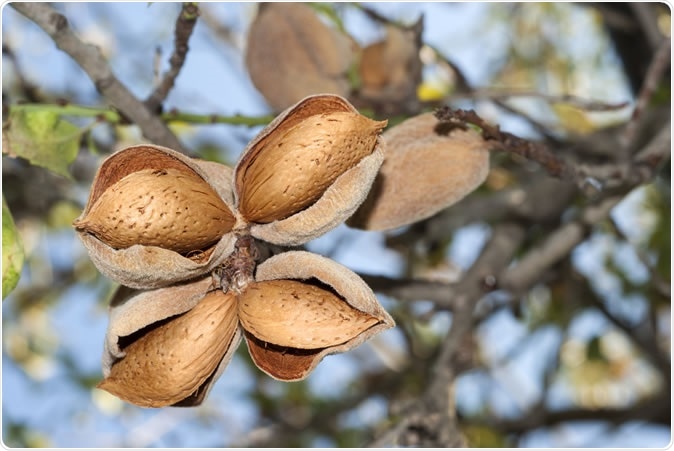A new study reveals that 4 in 10 people who have peanut allergies choose not to consume tree nuts, despite not having allergies to these nuts. The study titled, “Real world tree nut consumption in peanut-allergic individuals,” was published in Annals of Allergy, Asthma and Immunology in the latest issue. The journal is the scientific journal of the American College of Allergy, Asthma and Immunology (ACAAI).

Almond on tree, four almond, cultivation. Image Credit: AG Photo Design / Shutterstock
The team of researchers behind this work say that many persons with peanut allergy can safely consume tree nuts but do not consume them for fear of cross allergies. The team assessed consumption of tree nuts such as “almond, cashew, hazelnut, pecan, pistachio, and walnut”.
Shahzad Mustafa, MD, ACAAI member and lead author of the study said, “The results showed that nearly 90 percent of people with a peanut allergy in the study could potentially tolerate almonds, but 33 percent of that group preferred strict avoidance due to fear of an allergic reaction. The most common reason for choosing to avoid all tree nuts was to minimize the risk of cross contact. This can happen when a food is cooked with or near something that contains an allergen. Kitchen tools such as knives or spoons can also contribute to cross contact when they are used to mix multiple foods.”
The team wrote, “Peanut allergy affects 1-2% of individuals in the United States, and is increasing in prevalence... Peanut allergy significantly impacts quality of life, as it is typically lifelong, is the leading cause of food-induced anaphylaxis in children, and the leading cause of food allergy-related deaths... Historically, peanut-allergic individuals were advised to avoid tree nuts for multiple reasons, including concerns about cross contact, concomitant tree nut allergy and risk of developing tree nut allergy in the future.”
The study enrolled 258 individuals who had peanut allergy and of these 37 percent and 24 percent consumed all or some tree nuts respectively. The study took place at the Rochester Regional Health (RRH) outpatient allergy practice in Rochester, NY between January and April 2019. Of these individuals 39 percent consumed no tree nuts. Of the 100 people who did not consume tree nuts, the team found that 50 percent were scared of cross contact and 16 percent did not wish to eat tree nuts. A further 12 percent did not eat tree nuts because of fear of being allergic and 13 percent did not consume the nuts because they were too young for nuts.
Allergy specialist Allison Ramsey, ACAAI member of the ACAAI Anaphylaxis Committee and one of the authors of the study said, “We found people allergic to peanut who consume foods with precautionary labelling (PAL) are more likely to choose to eat tree nuts as compared to those who don't eat foods with PAL. In the study, 37 percent of those with peanut allergy consumed foods with PAL and 63 percent reported avoiding all foods with PAL.” These foods with PAL mention in warning if the ingredients contained allergic substances but do not warn about their general safety.
They warned that tree nut avoidance could be unwarranted and harmful for health. They wrote, “Unnecessary avoidance of tree nuts in peanut-allergic individuals may have multiple deleterious effects on overall health and quality of life. Avoidance of multiple foods can adversely impact growth, and tree nuts may be an important source of nutrition in individuals avoiding other foods groups, whether due to coexisting food allergies or dietary preference.” They added, “Tree nut consumption has also been shown to reduce risk of cardiovascular disease, total cancer, and all-cause mortality. Furthermore, it has also been shown that patient-reported quality of life decreases as the number of foods being avoided increases.”
Dr. Mustafa added in conclusion, “People with peanut allergy should be aware that it may be safe to consume some, if not all tree nuts, and tree nut consumption can contribute to a nutritious diet. In addition, our data indicated that avoiding foods with PAL may have an overly restrictive impact on the diet of people with peanut allergy. Eating foods with PAL is something people with food allergies should discuss with their allergist and take into consideration when creating their diet.”
They wrote in conclusion, “In our study, the most important predictor of tree nut consumption was an individual or family’s willingness to consume foods with PAL. If individuals or families with peanut allergy were comfortable consuming foods with PAL, they were significantly more likely to broaden their diet to include tree nuts. This stresses the importance of discussing the utility of PAL in the management of food allergy.”
Journal reference:
Real world tree nut consumption in peanut-allergic individuals Mustafa, S. Shahzad et al. Annals of Allergy, Asthma & Immunology, https://www.annallergy.org/article/S1081-1206(19)31457-7/fulltext